|
|
|
Sort Order |
|
|
|
Items / Page
|
|
|
|
|
|
|
| Srl | Item |
| 1 |
ID:
189506
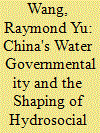

|
|
|
|
|
| Summary/Abstract |
This paper examines China's water governmentality in advancing the Lancang-Mekong Cooperation (LMC). It attends to how discourses, used as a political instrument, are framed, justified and contested in the reshaping of international hydrosocial territories. China's official and popular discourses present the LMC as promoting multilateral politics, economic benefits and social integration, while they obscure polarizing politics, external interventions and regional conflicts. Using strategies of positive publicity first, top-down communication and mutual empathy creation, these discourses aim to deflect attention away from controversies and geopolitics in the region to construct governable hydrosocial territories. However, in a transnational context where the Chinese state cannot unilaterally control geographical imaginaries, alternative discourses depict China as a “hydro-hegemon” that poses threats to downstream countries. The discursive dichotomy reflects multiple ontologies of water and power struggles in international river governance, bringing regional stability and sustainable development into question.
|
|
|
|
|
|
|
|
|
|
|
|
|
|
|
|
| 2 |
ID:
189503
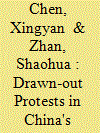

|
|
|
|
|
| Summary/Abstract |
The rise of the land revenue regime in China, characterized by land dispossession in the countryside and land redevelopment in the city, has sparked numerous protests. This study draws attention to the paradox that the regime has helped to mitigate labour unrest, at least temporarily, in China's Rustbelt, where millions of workers were laid-off in the 1990s. Based on field research in Anshan, Liaoning province, and data from other cities in the Rustbelt, this article shows that laid-off workers’ protests persisted much longer than previously thought, largely owing to a lack of local fiscal resources to meet workers’ demands. Only with the growing revenue from land sales in the recent decade has the local government finally been able to ease the tension with laid-off workers. The article argues that bargained authoritarianism, or “buying stability,” widely considered to be an effective strategy by the local state to control social unrest, has its limits, mainly owing to its dependence on local fiscal resources. Recent economic downturns and declining land revenue will disrupt this strategy, leading to protracted protests and struggles in future.
|
|
|
|
|
|
|
|
|
|
|
|
|
|
|
|
| 3 |
ID:
189496


|
|
|
|
|
| Summary/Abstract |
The European Union's position on “one China” has stood since the establishment of diplomatic relations with the People's Republic of China (PRC) in 1975. As a union of distinct member states, the nature of the European Union's (EU) foreign policymaking complicates efforts to maintain coherent common positions. Its effective “one China policy” (and those of its member states) is no exception. In recent years, the edges of the bloc's long-standing policy have started to fray as the EU–PRC relationship has become more fraught and many member states have sought to deepen their effective, if “unofficial,” engagement with Taiwan. I explore these changes to the EU's effective “one China policy” by employing a subsystems framework, starting from the position that the EU has foreign policies (rather than a singular policy) created through three subsystems. Through the Normative Power Europe lens, I explore the extent to which the actors pulling at these “threads” at the edges of the EU's policy are motivated by normative concerns. I argue that the “fraying” of the EU's “one China policy” is not the result of a conscious decision by the EU as a collective normative actor but stems from shifting preferences within the national and supranational subsystems.
|
|
|
|
|
|
|
|
|
|
|
|
|
|
|
|
| 4 |
ID:
189507
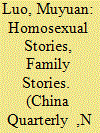

|
|
|
|
|
| Summary/Abstract |
This article investigates the recent proliferation of family-themed homosexual stories in China based on life-history interviews and participant observation conducted in Shenzhen. We develop the concept of “neo-Confucian homonormativity” – characterized by a harmonious relationship between gay men and their families of origin and their ability and aspiration to enter a monogamous relationship and become parents – to explain the production, circulation and consumption of these stories in the Chinese gay community. We argue that these stories are socially embedded actions enabled by the emerging neoliberal sexual politics in the Chinese gay community that influence the organization of the Chinese gay community and Chinese gay men's lived experiences. By analysing the emerging storytelling practices in the Chinese gay community, this article challenges the Western-centric way of theorizing homonormativity and opens up the possibility to conceptualize homonormativity from an Asian perspective.
|
|
|
|
|
|
|
|
|
|
|
|
|
|
|
|
| 5 |
ID:
189499
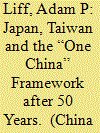

|
|
|
|
|
| Summary/Abstract |
This study analyses the “one China” framework's significance for Japan–Taiwan relations since Tokyo switched diplomatic recognition from Taipei to Beijing in 1972. Drawing on Chinese-, Japanese- and English-language sources, it examines developments since the breakthrough Japan–PRC normalization communiqué and the “Japan formula,” which enabled Tokyo to normalize relations – six years before Washington – without recognizing Beijing's claim of sovereignty over Taiwan, and while maintaining robust, if unofficial, ties with Taipei thenceforth. Highlighting distinctions between Beijing's self-asserted “one-China principle” and Japan's ambiguous official position and subsequent effective policies, it assesses incremental but practically significant evolutions of Japan–Taiwan relations over the past half-century. In the 21st century, the trend towards incrementally closer ties has proven strikingly resilient to political transitions in Japan and Taiwan, China's growing power, pushback from Beijing and worsening cross-Strait frictions. Beyond Japan–Taiwan relations and theoretical debates on “one China,” this article's findings carry significant implications for Taiwan's international space, cross-Strait dynamics and China–Japan–United States relations.
|
|
|
|
|
|
|
|
|
|
|
|
|
|
|
|
| 6 |
ID:
189500
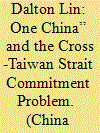

|
|
|
|
|
| Summary/Abstract |
Fifty years after the current “one China” framework emerged in international politics, the cross-Taiwan Strait “one China” dispute has transformed from its historical nature of indivisible sovereignty. As Taipei has stopped competing internationally to represent “China” since 1991, Beijing now worries that compromising its “one-China principle” in cross-Strait reconciliation would enhance Taiwan's separate statehood internationally and enable the island to push towards de jure independence. In contrast, Taipei worries that any perceived concessions on the question of “one China” would enhance China's sovereignty claim over Taiwan and enable Beijing to push for unification coercively with fewer concerns about international backlash. Improved cross-Strait relations thus rely on circumventing this quintessential commitment problem in international politics.
|
|
|
|
|
|
|
|
|
|
|
|
|
|
|
|
| 7 |
ID:
189497


|
|
|
|
|
| Summary/Abstract |
This article examines the abiding “one China” contention between the People's Republic of China (PRC) and the Republic of China (ROC or Taiwan), focusing on their 2008–2016 cooperation and the ensuing political stalemate. It does so by investigating the PRC's and the ROC's respective legal frameworks and the positions of the major political actors, including the Chinese Communist Party and both Taiwan's Kuomintang and its Democratic Progressive Party. While the PRC maintains its “one-China principle,” and the ROC's legal system retains some “one China” elements, the idea of “one China” has been in flux in Taiwan. The traditional conceptualization of “one China” has been increasingly challenged in Taiwan's democratic era by the rise of a countervailing Taiwanese national identity and opposition to the PRC's insistent agenda to absorb the island. These dynamics are rapidly minimizing the appeal and political utility of any “one China” notions in China–Taiwan relations.
|
|
|
|
|
|
|
|
|
|
|
|
|
|
|
|
| 8 |
ID:
189495
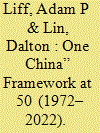

|
|
|
|
|
| Summary/Abstract |
This lead article surveys the history and evolving policy legacies of the “one China” framework 50 years after US President Richard Nixon's historic 1972 visit to China. It begins by introducing key concepts and highlighting the crucial difference between Beijing's self-defined “one-China principle” and the US's, Japan's and key other countries’ variable “one China” policies as it relates to Taiwan. It argues that three seminal 1970s developments consolidated the “one China” framework as an informal institution of international politics. The ambiguity baked in by Cold War-era geopolitical necessity provided flexibility sufficient to enable diplomatic breakthroughs between erstwhile adversaries, but also planted seeds for deepening contestation and frictions today. Recent developments – especially Taiwan's democratization and Beijing's increasingly bold and proactive assertion of its claim to sovereignty over Taiwan – have transformed incentive structures in Taipei and for its major international partners. The net effect is that the myth of “consensus” and the ambiguities enabling the framework's half-century of success face unprecedented challenges today.
|
|
|
|
|
|
|
|
|
|
|
|
|
|
|
|
| 9 |
ID:
189501


|
|
|
|
|
| Summary/Abstract |
How do state authorities cope with popular contention under authoritarian legality? Based on ethnographic fieldwork and legal repression cases in China, this article highlights that conflicting rules and signals regarding contention management can impose considerable pressure on governments and motivate them to respond cautiously, even though the prevailing rhetoric of law-based governance provides a convenient basis on which authorities can legitimize their coercive actions. This study further theorizes a discreet pattern of government reaction under authoritarian legality – progressive legal repression – that rests on bureaucratic processing to overcome political uncertainty and lower potential risks before formally employing criminal sanctions to achieve domination. Instead of directly using criminal penalties to deter unruly protesters and potential dissenters, the preferred state action is to induce them to engage in available legal-bureaucratic procedures. By reconceptualizing protesters’ claims and behaviour as unreasonable and signalling fulfilment of responsibilities, bureaucratic practices help officials to reduce the risks of damaging their political image and receiving disciplinary action, encouraging them to deploy legal repression. This study reveals more complicated dynamics of state repression under authoritarian legality and emphasizes the important effects of procedural practices on governmental responses and the regime's stability.
|
|
|
|
|
|
|
|
|
|
|
|
|
|
|
|
| 10 |
ID:
189504


|
|
|
|
|
| Summary/Abstract |
In 1968, at the height of the Chinese Cultural Revolution (CR hereafter), Mao Zedong mobilized industrial workers to form Workers’ Mao Zedong Thought Propaganda Teams (WPT hereafter) and to “occupy” the superstructure. This move empowered the working class in an unprecedented way. Did Mao's move bring about a new model of worker power under communism that was distinct from Lenin's vanguardist model and Rosa Luxemburg's model based on her perception of workers’ spontaneity and creativity? In contrast to the workers’ spontaneous rebel groups during the first two years of the CR, the WPTs were a quasi-institutionalized form of worker power created by the political elite to serve the CR agenda. It was also the Mao leadership's attempt to realize the leading role of the working class by absorbing workers into the structure of political authority, an attempt which reflected the Party's declared ideological principle. While the WPTs provided workers with opportunities to participate in politics, they were a misplacement of worker power in both social and organizational senses. The article examines the roots of this power misplacement and explores the dilemmas it brought for the Party as well as the working class itself, and why.
|
|
|
|
|
|
|
|
|
|
|
|
|
|
|
|
| 11 |
ID:
189498


|
|
|
|
|
| Summary/Abstract |
During the current global COVID-19 crisis Taiwan has portrayed itself as both an example for other countries to follow and as a country willing to assist others in their own efforts with the virus. Taiwan has also renewed efforts to participate in the World Health Organization (WHO), an organisation from which it is currently excluded. Although some countries have supported Taiwan's efforts to participate in the WHO or have praised its COVID-19 response, others have been silent or even critical, sometimes citing commitments to a “one China policy.” In this paper, we use newly collected data to explore cross-national variation in support for Taiwan during the current pandemic. We find that a country's level of economic development and security ties with the US are strongly correlated with support for Taiwan while a country's economic ties to China is a less consistent predictor.
|
|
|
|
|
|
|
|
|
|
|
|
|
|
|
|
| 12 |
ID:
189505


|
|
|
|
|
| Summary/Abstract |
Traditional analysis of China's policy experimentation has focused on the role of central–local relations and rotating leaders in shaping the local agenda-setting process. Less is known about the role of less mobile mid-level local bureaucrats who serve as bridges in the implementation process. This paper examines why some cities have performed better than others at implementing and maintaining low-carbon policy experiments. Drawing on a comparison of four case cities and over 100 expert interviews, I argue that the availability of bureaucratic entrepreneurs and their resource mobilization capacity determine the level of local engagement in climate policy experimentation. This study shows that the institutionalization of local policy experiments is not only driven by the central government or rotating top local leaders but also by bureaucratic entrepreneurs who help policy experiments survive periodic changes in the bureaucracy. The findings have important implications for the fulfilment of China's 2060 carbon neutrality pledge.
|
|
|
|
|
|
|
|
|
|
|
|
|
|
|
|
| 13 |
ID:
189502


|
|
|
|
|
| Summary/Abstract |
Migrant construction workers are among the most vulnerable working populations in China as they are prone to facing the problem of wage arrears under the multi-tier subcontracting system. Based on ethnographic research of migrant construction workers in Tianjin, Shenzhen, Nanchang and Shaoguan, we examine workers’ divergent responses to wage arrears. While extant literature focuses on the positive role of informal networks in facilitating collective action, our findings indicate that the network structure between labour subcontractors and migrant workers plays a key role in enabling or constraining labour protests. We identify two network structures: the satellite network – characterized by arm's-length relationships between subcontractors and clusters of workers; and the spider-web network – characterized by strong relationships between subcontractors and their workers. We found that workers in satellite networks were prone to stage protests over wage arrears, but those in spider-web networks never held collective actions when facing the same problem. We argue that strong guanxi is a double-edged sword for the mobilization of labour protests and that workers’ responses to wage arrears are mediated through the network structure. Future studies may further scrutinize the role of a social network and its operating mechanisms in shaping workers’ working conditions and labour politics.
|
|
|
|
|
|
|
|
|
|
|
|
|
|
|
|
|
|
|
|
|